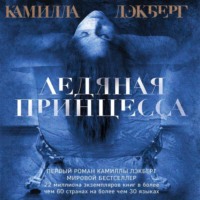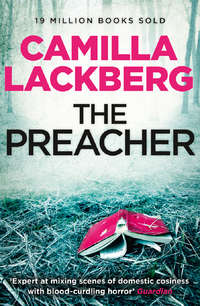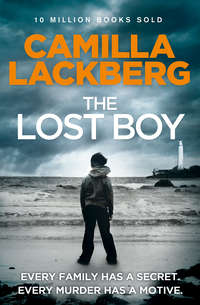
Полная версия
The Ice Child
Gösta nodded. ‘I’ll phone them.’
‘Do you have any information about what happened?’ asked Patrik.
‘Only that she was hit by a car. She has severe internal bleeding, as well as a head injury, though we don’t yet know the extent of that injury. We’ll keep her sedated for a while after the operation in order to minimize any brain damage. If she survives, that is.’
‘We heard that she had suffered some sort of injuries prior to the accident.’
‘Yes,’ said Strandberg, hesitating. ‘We don’t know exactly which injuries are the result of the accident and which occurred previously. But …’ He seemed to be struggling for the right words. ‘Both of her eyes are gone. And her tongue.’
‘Gone?’ Patrik looked at the doctor in disbelief. Out of the corner of his eye he saw Gösta’s equally astonished expression.
‘Yes. Her tongue has been severed, and her eyes have somehow been … removed.’
Gösta covered his mouth with his hand. His face had taken on a slightly greenish tinge.
Patrik swallowed hard. For a moment he wondered whether he was having a nightmare, and hoped he would soon wake up. Then he would be relieved to find it was all a dream and could turn over and go back to sleep. But this was real. Disgustingly real.
‘How long do you think the surgery will take?’
Strandberg shook his head. ‘It’s hard to say. As I mentioned, she has massive internal bleeding. Maybe two or three hours. At the least. You can wait here.’ He gestured towards the large waiting room.
‘I’ll go and ring the family,’ said Gösta, moving away down the corridor.
Patrik didn’t envy him the task. The Hallberg family’s initial joy and relief at hearing that Victoria had been found would swiftly be replaced with the same despair and dread they’d been living with for the past four months.
He sat down on one of the hard chairs. Images of Victoria’s injuries whirled through his mind. But his thoughts were interrupted when a frantic nurse stuck her head in the door and shouted for Strandberg. Patrik hardly had time to react before the doctor dashed from the waiting room. Out in the corridor Patrik could hear Gösta talking on the phone with one of Victoria’s relations. The question was, what news would they hear next?
Ricky tensely studied his mother’s face as she talked on the phone. He strained to read every expression, hear every word. His heart was pounding so hard in his chest that he could hardly breathe. His father sat next to him, and Ricky sensed that his heart was hammering just as hard. It felt like time was standing still, as if it had stopped at that exact moment. All his senses were somehow heightened. Even as he focused his full attention on the phone conversation, he could clearly hear every other sound. He could also feel the wax tablecloth under his clenched fists, the wisp of hair that was tickling the back of his neck under his collar, and the linoleum floor under his feet.
The police had found Victoria. That was the first thing they heard. His mother had recognized the number and grabbed the phone. Ricky and his father had instantly stopped eating their food when they heard her say, ‘What’s happened?’
No courteous greeting, no ‘hello’, no mention of anyone’s name, which was his mother’s usual way of answering the phone. Lately all such things – common courtesies, social rules, what one should or should not do – had ceased to matter. Those sorts of things belonged to their life before Victoria disappeared.
Neighbours and friends had arrived in a steady stream, bringing food and awkwardly offering well-intentioned words. But they never stayed long. Ricky’s parents couldn’t bear all the questions or the kindness, concern, and sympathy in everyone’s eyes. Or the relief, always the same hint of relief that they were not the ones in this situation. Their children were all at home, safe and sound.
‘We’ll leave right now.’
His mother ended the conversation and slowly placed her mobile on the worktop, which was the old-fashioned kind, made of steel. For years she had nagged his father to replace it with something more modern, but he had grumbled that there was no need to replace anything that was clean and in one piece and still fully functional. And his mother had never insisted. She simply brought up the topic on occasion, in the hope that her husband would suddenly change his mind.
Ricky didn’t think his mother cared any longer about what sort of kitchen worktop they had. It was strange how things like that quickly lost all importance. All that mattered was finding Victoria.
‘What did they say?’ asked Ricky’s father. He had stood up, but Ricky was still sitting at the table, staring down at his clenched fists. His mother’s expression told them they wouldn’t want to hear what she had to say.
‘They’ve found her. But she’s seriously injured and in hospital in Uddevalla. Gösta said we need to get there fast. That’s all I know.’
She burst into tears and then sank down as if her legs could no longer support her. Her husband just managed to catch her. He stroked her hair and hushed her, but tears were running down his face too.
‘We need to get going, sweetheart. Put on your jacket, and we’ll leave right away. Ricky, help your mother. I’ll go out and start the car.’
Ricky nodded and went over to his mother. Gently he put his arm around her shoulders and got her to move towards the front hall. There he grabbed her red down coat and helped her to put it on, the way a parent would help a child. One arm in, then the other, and he carefully zipped up the coat.
‘All right,’ he said, placing her boots in front of her. He squatted down and helped her to put them on too. Then he quickly put on his own jacket and opened the door. He could hear that his father had the car running. He was scraping off the windows so frantically that he’d created a cloud of frost, mixed with the vapour from his breath.
‘Bloody winter!’ he cried, scraping so hard that he was probably scratching the windscreen. ‘What a damn, sodding, bloody winter!’
‘Get in the car, Pappa,’ said Ricky. ‘I’ll do that.’ He took the scraper away from his father, after first settling his mother in the back seat. His father complied, offering no resistance. They had always let him believe that he was the one in charge in the family. The three of them – Ricky, his mother, and Victoria – had a secret agreement to allow Markus Hallberg to think that he ruled with an iron fist, even though they knew he was too nice to rule even with one finger. It had always been Helena Hallberg who had ensured that everything was done as it should be done – until Victoria disappeared. She had deflated so swiftly that Ricky sometimes wondered whether his mother had always been this shrivelled and dispirited person who was now sitting on the back seat, staring blankly into space, whether she had ever possessed a sense of purpose. Yet for the first time in months he saw something else in her eyes, a mixture of eagerness and panic prompted by the phone conversation with the police.
Ricky got in behind the wheel. It was strange how a gap in the family was filled, how instinctively he had stepped up to take his mother’s place. As if he possessed a strength he’d never known he had.
Victoria used to tell him that he was like Ferdinand the bull. Lazy and foolishly nice on the outside, but in moments of crisis he would always come through. He’d give her a playful nudge and pretend to be offended, but secretly he was happy to be compared to Ferdinand the bull. Although lately he no longer had time to sit and smell the flowers. He wouldn’t be able to do that again until Victoria came back.
Tears began running down his cheeks and he wiped them off on the sleeve of his jacket. He hadn’t allowed himself to think that she might never come home. If he’d done that, he would have fallen apart.
And now Victoria had been found. Though they didn’t yet know what awaited them at the hospital. He had a feeling they might not want to know.
Helga Persson peered out of the kitchen window. A short while ago she’d seen Marta come riding into the yard at full gallop, but now everything was quiet. She had lived here a long time, and the view was very familiar, even though it had changed a bit over the years. The old barn was still there, but the cowshed, where they’d kept the cows she’d taken care of, had been torn down. In its place was the stable Jonas and Marta had built for their riding school.
She had been happy that her son had decided to settle so close by, that they were neighbours. Their houses stood only a hundred metres apart, and since he ran his veterinary clinic at home, he frequently stopped in to see her. Every visit made her day a little brighter, which was what she needed.
‘Helga! Helgaaaa!’
She closed her eyes as she stood next to the worktop. Einar’s voice filled every nook and cranny of the house, enveloping her and making her clench her fists. But she no longer had the will to flee. He had beat it out of her years ago. Even though he was now helpless and completely dependent on her, she was incapable of leaving him. That wasn’t something she considered any more. Because where would she go?
‘HELGAAAA!’
His voice was the only thing left that still retained its former strength. The illnesses and then the amputation of both legs as a result of neglecting his diabetes had robbed him of his physical strength. But his voice was as commanding as ever. It continued to force her into submission just as effectively as his fists used to do. The memories of all those blows, the cracked ribs and throbbing bruises, were still so vivid that the mere sound of his voice could provoke terror and the fear that this time she might not survive.
She straightened up, took a deep breath, and called out:
‘I’m coming!’
Briskly she climbed the stairs. Einar didn’t like to be kept waiting, he never had, but she didn’t understand why there was always such a hurry. He had nothing else to do but sit and grumble, his complaints ranging from the weather to the government.
‘It’s leaking,’ he said when she came into the room.
She didn’t reply. Simply rolled up her sleeves and went over to him to find out how great the damage might be. She knew he enjoyed this sort of situation. He could no longer use force to hold her captive. Instead he relied on his need for care and attention, which she should have bestowed on the children she’d never had, the ones he had beaten out of her body. Only one had lived, and there were times when she thought it might have been best if that child had also been expelled in a rush of blood between her legs. Yet she didn’t know what she would have done if she hadn’t had him. Jonas was her life, her everything.
Einar was right. The colostomy bag was leaking. And not just a little bit. Half his shirt was soaked through.
‘Why didn’t you get here faster?’ he said. ‘Didn’t you hear me calling? I suppose you had something more important to do.’ He glared at her with his watery eyes.
‘I was in the bathroom. I came as quick as I could,’ she said, unbuttoning his shirt. Carefully she pulled his arms out of the sleeves, not wanting to get even more of his body wet.
‘I’m freezing.’
‘I’ll get you a clean shirt. I just need to wash you off first,’ she said with all the patience she could muster.
‘I’m going to catch pneumonia.’
‘I’ll be fast. I don’t think you’ll catch cold.’
‘Oh, so now you’re a nurse too, huh? I suppose you even know better than the doctors.’
She said nothing. He was just trying to throw her off balance. He liked it best when she cried, when she begged and pleaded with him to stop. Then he was filled with a great sense of calm and satisfaction that made his eyes shine. But today she wasn’t going to give him that pleasure. These days she usually managed to avoid such scenes. Most of her tears had been shed years ago.
Helga went into the bathroom to fill a basin with water. The whole procedure had become routine: fill the basin with water and soap, wet the rag, wipe off his soiled body, put him into a clean shirt. She suspected that Einar purposely made the bag leak. According to his doctor, it was impossible for it to leak so frequently. Yet the bags kept on leaking. And she kept on cleaning up her husband.
‘The water’s too cold.’ Einar flinched as the rag rubbed at his stomach.
‘I’ll make it warmer.’ Helga stood up, went back to the bathroom, put the basin under the tap and turned on the hot water. Then she returned to the bedroom.
‘Ow! It’s scalding! Are you trying to burn me, you bitch?’ Einar shouted so loud that she jumped. But she didn’t say a word, just picked up the basin, carried it out, and filled it with cold water, this time making sure that it was only slightly warmer than body temperature. Then she carried it back to the bedroom. This time he didn’t comment when the rag touched his skin.
‘When is Jonas coming?’ he asked as she wrung out the rag, turning the water brown.
‘I don’t know. He’s working. He went over to the Andersson place. One of their cows is about to calve, but the calf is in the wrong position.’
‘Send him up here when he arrives,’ said Einar, closing his eyes.
‘Okay,’ said Helga quietly, as she wrung out the rag again.
Gösta saw them coming down the hospital corridor. They were hurrying towards him, and he had to fight his impulse to flee in the opposite direction. He knew that what he was about to tell them was written all over his face, and he was right. As soon as Helena met his eye, she fumbled to grab Markus’s arm and then sank to the floor. Her scream echoed through the corridor, silencing all other sounds.
Ricky stood there as if frozen in place. His face white, he had stopped behind his mother while Markus carried on walking. Gösta swallowed hard and went to meet them. But Markus passed him with unseeing eyes, as if he hadn’t seen the same bad news in Gösta’s expression that his wife had seen. He kept on walking along the corridor with no apparent goal in mind.
Gösta didn’t move to stop him. Instead, he went over to Helena and gently lifted her to her feet. Then he put his arms around her. That was not something he usually did. He had let only two people into his life: his wife, and the little girl who had lived with them for a brief time and who now, through the inexplicable workings of fate, had come into his life again. So it didn’t feel particularly natural for him to be standing there, embracing a woman whom he’d known for such a short time. But ever since Victoria disappeared, Helena had rung him every day, alternating between hope and despair, anger and grief, to ask about her daughter. Yet he’d been able to give her only more questions and more worry. And now he had finally extinguished all hope. Holding her in his arms and allowing her to weep on his chest was the least he could do.
Gösta looked over Helena’s head to meet Ricky’s eye. There was something odd about the boy. For the past few months he had been the family’s mainstay, keeping them going. But now he stood there in front of Gösta, his face white and his eyes empty, looking like the young boy he actually was. And Gösta knew that Ricky had lost for ever the innocence granted only to children, the belief that everything would be okay.
‘Can we see her?’ asked Ricky, his voice husky. Gösta felt Helena stiffen. She pulled away, wiped her tears on the sleeve of her coat and gave him a pleading look.
Gösta fixed his gaze on a distant point. How could he tell them that they wouldn’t want to see Victoria? And why.
Her entire study was cluttered with papers: typed notes, Post-it notes, newspaper articles, and copies of photographs. It looked like total chaos, but Erica thrived in this sort of working environment. When she was writing a book, she wanted to be surrounded by all the information she’d gathered, all her thoughts on the case.
This time, however, it felt as if she might be in over her head. She had accumulated plenty of background details and facts, but it had all been obtained from second-hand sources. The quality of her books and her ability to describe a murder case and answer all the questions readers might have relied on her ability to secure first-hand accounts. Thus far she had always been successful. Sometimes it had been easy to persuade those involved to talk to her. Some had even been eager to talk, happy for the media attention and a moment in the spotlight. But occasionally it had taken time and she’d been forced to cajole the person, explaining why she wanted to dredge up the past and how she intended to tell the story. In the end she had always won out. Until now. She was getting nowhere with Laila. During her visits to the prison she had struggled to get Laila to talk about what happened, but in vain. Laila was happy to talk to her, just not about the murder.
Frustrated, Erica propped her feet up on the desk and let her thoughts wander. Maybe she should ring her sister. Anna had often been a source of good ideas and new angles in the past, but she was not herself these days. She had gone through so much over the past few years, and the misfortunes never seemed to stop. Part of her suffering had been self-imposed of course, yet Erica had no intention of judging her younger sister. She understood why certain things had happened. The question was whether Anna’s husband could understand and forgive her. Erica had to admit that she had her doubts. She had known Dan all her life. When they were teenagers they’d dated for a while, and she knew how stubborn he could be. In this instance, the obstinacy and pride that were such a feature of his personality had proved self-destructive. And the result was that everyone was unhappy. Anna, Dan, the children, even Erica. She wished that her sister would finally have some happiness in her life after the hell she had endured with Lucas, her children’s father.
It was so unfair, the way their lives had turned out so differently. She had a strong and loving marriage, three healthy children, and a writing career that was on the upswing. Anna, on the other hand, had encountered one setback after another, and Erica had no idea how to help her. That had always been her role as the big sister: to protect and support and offer assistance. Anna had been the wild one, with such a zest for life. But all that vitality had been beaten out of her until what remained was only a subdued and lost shell. Erica missed the old Anna.
I’ll phone her tonight, she resolved as she picked up a stack of newspaper articles and began leafing through them. It was gloriously quiet in the house, and she was grateful that her job made it possible for her to work at home. She had never felt any need for co-workers or an office setting. She worked best on her own.
The absurd thing was that she was already longing for the hour when she would leave to fetch Maja and the twins. How was it possible for a parent to have such contradictory emotions about the daily routines? The constant alternating between highs and lows was exhausting. One moment she’d be sticking her hands in her pockets and clenching her fists, the next she’d be hugging and kissing the children so much that they begged to be let go. She knew that Patrik felt the same way.
For some reason thinking about Patrik and the kids led her back to the conversation with Laila. It was so incomprehensible. How could anyone cross that invisible yet clearly demarcated boundary between what was permitted and what was not? Wasn’t the fundamental essence of a human being the ability to restrain his or her most primitive urges and do what was right and socially acceptable? To obey the laws and regulations which made it possible for society to function?
Erica continued glancing through the articles. What she had said to Laila today was true. She would never be capable of doing anything to harm her children. Not even in her darkest hours, when she was suffering from postnatal depression after Maja was born, or caught up in the chaos following the twins’ arrival, or during the many sleepless nights, or when the tantrums seemed to go on for hours, or when the kids repeated the word ‘No!’ as often as they drew breath. She had never come close to doing anything like that. But in the stack of papers resting on her lap, in the pictures lying on her desk, and in her notes, there was proof that the boundary could indeed be crossed.
In Fjällbacka the house in the photographs had become known as the House of Horrors. Not a particularly original name, but definitely appropriate. After the tragedy, no one had wanted to buy the place, and it had gradually fallen into disrepair. Erica reached for a picture of the house as it had looked back then. Nothing hinted at what had gone on inside. It looked like a completely normal house: white with grey trim, standing alone on a hill with a few trees nearby. She wondered what it looked like now, how run-down it must be.
She sat up abruptly and placed the photo back on her desk. Why not drive out there and have a look? While researching her previous books she’d always visited the crime scene, but she hadn’t done that this time. Something had been holding her back. It wasn’t that she’d made a conscious decision not to go out there; more that she had simply stayed away.
It would have to wait until tomorrow though. Right now it was time to go and fetch her little wildcats. Her stomach knotted with a mixture of longing and fatigue.
The cow was struggling valiantly. Jonas was soaked with sweat after spending several hours trying to turn the calf around. The big animal kept resisting, unaware that they were trying to help her.
‘Bella is our best cow,’ said Britt Andersson. She and her husband Otto ran the farm which was only a couple of kilometres from the property owned by Jonas and Marta. It was a small but robust farm, and the cows were their main source of income. Britt was an energetic woman who supplemented the money they made from milk sales to Arla by selling cheese from a little shop on their property. She was looking worried as she stood next to the cow.
‘She’s a good cow, Bella is,’ said Otto, rubbing the back of his head anxiously. This was her fourth calf. The previous three births had all gone fine. But this calf was in the wrong position and refused to come out, and Bella was obviously exhausted.
Jonas wiped the sweat from his brow and prepared to make yet another attempt to turn the calf so it could finally slide out and land in the straw, sticky and wobbly. He was not about to give up, because then both the cow and the calf would die. Gently he stroked Bella’s soft flank. She was taking, short, shallow breaths, and her eyes were open wide.
‘All right now, girl, let’s see if we can get this calf out,’ he said as he again pulled on a pair of long rubber gloves. Slowly but surely he inserted his hand into the narrow canal until he could touch the calf. He needed to get a firm grip on a leg so he could pull on it and turn the calf, but he had to do it cautiously.
‘I’ve got hold of a hoof,’ he said. Out of the corner of his eye he saw Britt and Otto craning their necks to get a better look. ‘Nice and calm now, girl.’
He spoke in a low voice as he began to tug at the leg. Nothing happened. He pulled a little harder but still couldn’t budge the calf.
‘How’s it going? Is it turning?’ asked Otto. He kept scratching his head so often that Jonas thought he would end up with a bald spot.
‘Not yet,’ said Jonas through clenched teeth. Sweat poured off him, and a strand of hair from his blond fringe had fallen in his eyes so he kept having to blink. But right now the only thought in his mind was getting the calf out. Bella’s breathing was getting shallower, and her head kept sinking into the straw, as if she were ready to give up.
‘I’m afraid of breaking something,’ he said, pulling as hard as he dared. And something moved! He pulled a bit harder, holding his breath and hoping not to hear the sound of anything breaking. Suddenly he felt the calf shift position. A few more cautious tugs, and the calf was lying on the ground, feeble but alive. Britt rushed forward and began rubbing the newborn with straw. With firm, loving strokes she wiped off its body and massaged its limbs.









